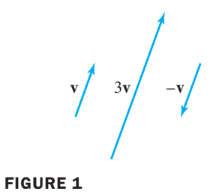Ch04 Vector Space
4.1 Vector Spaces and Subspaces
Definition : Vector Space
A Vector space is a nonempty set of objects, called vectors,
on which are defined two operations, called
- addition and
- multiplication by scalars (real numbers),
subject to the ten axioms (or rules) listed below.
The axioms must hold for all vectors ,, and in for all scalars and .
- The sum of and , denoted by , is in .
- :commutative
- . :associative
- There is a zero vector in such that .
- For each in , there is a vector in such that .
- The scalar multiple of by , denoted by , is in .
- . :distributive
- :distributive
- . : associative
Scalar를 real number로 제한하지 않고 complex number로 확장할 경우, complex vector space가 되며 이 아닌 상의 vector들을 다루게 된다.
Using these axioms, we can show that
- the zero vector in Axiom 4 is unique, and the vector , called the negative of , in Axiom 5 is unique* for each in .
For each in and scalar ,
Example 2:
Let be the set of all arrows (directed line segments) in three-dimensional space, with two arrows regarded as equal if they have the same length and point in the same direction. Define addition by the parallelogram rule, and for each in , define to be the arrow whose length is times the length of , pointing in the same direction as if and otherwise pointing in the opposite direction.
See the following figure below. Show that is a vector space.

Solution:
- The definition of is geometric, using concepts of length and direction.
- No x y z-coordinate system is invovled.
- An arrow of zero length is a single point and represents the zero vector.
- The negative of is .
- So Axioms 1, 4, 5, 6, and 10 are evident. See the figures below.

Definition
A subspace of a vector space is a subset of that has three properties:
- The zero vector of is in .
- is closed under vector addtion. That is, for each and in , the sum is in .
- is closed under multiplication by scalars. That is, for each in and each scalar , the vector is in .
- Properties (1), (2), and (3) guarantee that a subspace of is itself a vector space, under the vector space operations already defined in .
- Every subspace is a vector space.
- Conversely, every vector space is a subspace (of itself and possibly of other larger spaces).
A Subspace Spanned by a Set
The set consisting of only the zero vector in a vector space is a subspace of , called the zero subspace and written as .
As the term liniear combination refers to any sum of scalar multiples of vectors, and denotes the set of all vectors that can be written as linear combinations of .
Example 10:
Given and in a vector space , let . Show that is a subspace of .
Solution:
- The zero vector is in , since .
- To show that is closed uncer vector addition, take two arbitrary vectors in , say,
- By Axioms 2,3, and 8 for the vector space ,
- So is in .
Furthermore, if is any scalar, then by Axioms 7 and 9, which shows that is in and is closed under scalar multiplication.
Thus is a subspace of .
Theorem 1:
If are in a vector space , then is a subspace of .
We call the subspace spanned (or **generated) by .
Give any subspace and , a spanning (or generating) set for is a set in such that